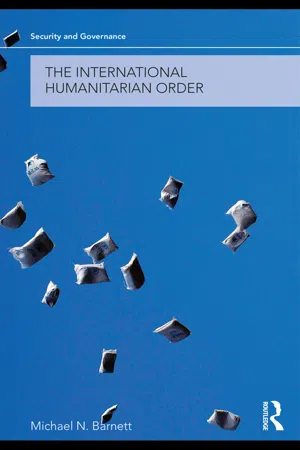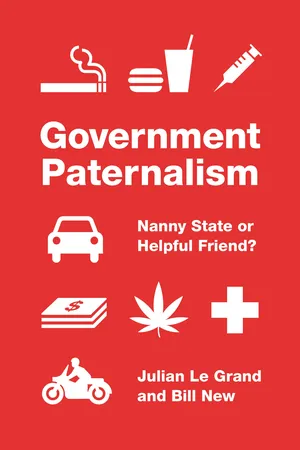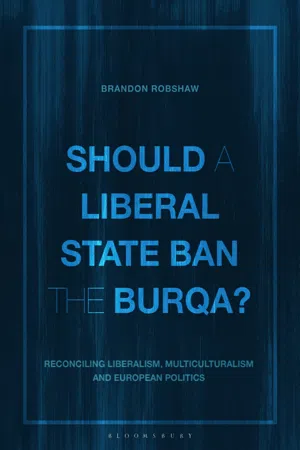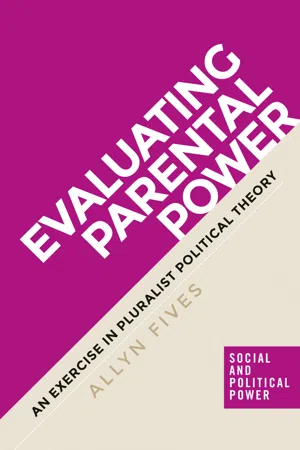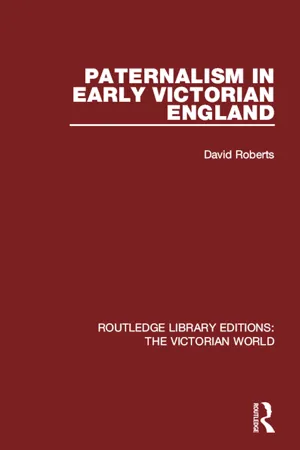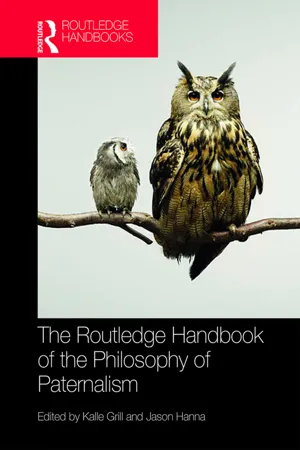Politics & International Relations
Paternalism
Paternalism refers to a governing or leadership style in which those in authority make decisions for others with the belief that they are acting in the best interest of the individuals. This approach can be seen as benevolent or controlling, depending on the perspective. It often involves a power imbalance and can be contentious in discussions of individual autonomy and freedom.
Written by Perlego with AI-assistance
Related key terms
Related key terms
1 of 4
Related key terms
1 of 3
6 Key excerpts on "Paternalism"
- eBook - ePub
- Michael Barnett(Author)
- 2009(Publication Date)
- Routledge(Publisher)
The concept of Paternalism provides one way of reuniting ethics and power. Paternalism can be generically understood as the belief that we can and should act in someone else’s best interests and even without their consent; the combination of care and control means that Paternalism offers a combustible mix of ethics and power. If the possibility of Paternalism is present in nearly all acts of compassion, which I believe it is, then it is most certainly a clear and present danger once compassion becomes institutionalized and globalized. In short, Paternalism is not an unfortunate legacy of nineteenth-century humanitarianism but rather is an enduring feature of the international humanitarian order. Not only is it impossible to remove the possibility and the presence of Paternalism, it is also not necessarily desirable—there are moments when Paternalism is highly defensible. Accordingly, the challenge is to consider whether and when forms of Paternalism are warranted and how to safeguard against the ever-present possibility that those who are in positions to care for others do not unjustifiably violate the autonomy, dignity, and liberty of the vulnerable. The concept of Paternalism challenges practitioners, forcing them into a world of greater uncertainty regarding whether they are truly doing the right thing. Anxiety need not be a prelude to ethical resignation; it also can generate an opening for a different kind of engagement with those in need.The international humanitarian order challenges not only the world of practice but also the world of scholarship. The discipline of international relations, much like the social sciences, has a history of considering the study of ethics and practical engagement as compromising the quest for objective, value-neutral, knowledge. The explicit incorporation of the language of ethics often unnerves the professional and modern social scientist, trained to consider ethical theory as either irrelevant or worthy of a few sentences at the end of the research. Yet my experience, which tracks with many of my colleagues whose scholarship focuses on genocide, humanitarianism, human rights, and public health, is that our choice of research subjects owes not to abstract curiosity or the discovery of an untapped data set but rather because we feel passionately about the importance of the subject, and retain hope that our research might advance our understanding of important developments in global affairs and make a difference to those outside our professional sanctums. It is nearly impossible to study the circumstances of the radical poor and the victims of structural and lethal violence without also considering what kinds of practical interventions might improve their circumstances, interventions that invariably include the language of causation and ethics. A healthy, vibrant, and relevant social sciences can only exist with practical ethics and engagement. - eBook - ePub
Government Paternalism
Nanny State or Helpful Friend?
- Julian Le Grand, Bill New(Authors)
- 2015(Publication Date)
- Princeton University Press(Publisher)
2 What Is Paternalism?A simple definition of Paternalism is the interference by some outside agent in a person’s freedom for the latter’s own good. It describes an action deemed impermissible by John Stuart Mill’s classic statement of the liberal position in On Liberty: “the only purpose for which power can be rightfully exercised over any member of a civilised community, against his will, is to prevent harm to others. His own good, either physical or moral, is not a sufficient warrant” (Mill 1974/1859, 68).Paraphrasing Mill, this states that the only justification for state intervention in an individual’s freedom is if that person is inflicting or is about to inflict harm on another; intervention designed to promote the individual’s own good is never justified.As is apparent, the simple definition of Paternalism above has two elements that, taken together, offend this principle—the interference in freedom, and the promotion of a person’s good. Very often a third element, the absence of consent, is included in definitions of Paternalism to accommodate Mill’s reference to the exercise of power against the individual’s will.But each of these three elements is controversial. Defining Paternalism has not proved straightforward; certainly no consensus has emerged in the philosophical literature (Garren 2006). One reason for the lack of consensus is that how one defines Paternalism will affect how easy it is to justify (or reject) what one has defined. A narrow definition will omit many acts that a broader definition might include as paternalistic. So someone adopting a narrow definition will be able to reject “Paternalism” completely while at the same time supporting an interference in an individual’s freedom that would have been included within a broader definition.1 - eBook - ePub
Should a Liberal State Ban the Burqa?
Reconciling Liberalism, Multiculturalism and European Politics
- Brandon Robshaw(Author)
- 2020(Publication Date)
- Bloomsbury Academic(Publisher)
good father, not an abusive, tyrannical or neglectful one: a father who makes and enforces decisions about what his children can and cannot do, in their interests, not his own, because are they not yet wise enough to make such decisions for themselves. Paternalism, then, is following a similar policy with regard not to children but to other adults. Thus, paternalist policies are:restrictions on a person’s liberty which are justified exclusively by consideration for that person’s own good or welfare, and which are carried out against his present will … or against his prior commitment.(Arneson 1980 : 471)Restricting the freedom of Wahhabist women to wear the burqa, for their own good, against their will, would be a clear case of Paternalism. Arneson’s definition is a useful starting point, but each of its three parts requires further comment.1. Restrictions on a person’s liberty in the case of a burqa-ban would be likely to involve legal prohibition backed by penalties. Burqa-wearing women could be fined, and if they persisted in defying the ban, perhaps imprisoned: the same approach as is used to enforce the paternalistic banning of certain recreational drugs. The restriction could also be enforced by attempting to cut off supply, again as with drugs: importation and sale of burqas or niqabs could be made punishable by law.2. I take the last part of the definition next as it can be dealt with more briefly than the middle one. The clause against his present will … or against his prior commitment narrows the definition unnecessarily. Amending it to irrespective of that person’s will would encompass the cases where the restriction was not against the person’s will, as well as those where it was. The broader definition is no less clear, and is more faithful to the spirit of the metaphor; fathers do restrict their children’s liberty for their own good, but not invariably against the child’s will. The child may cheerfully accept that they cannot have another biscuit, or that it is time to go to bed, or that they must practise the piano for twenty minutes, or brush their teeth for two, and might prefer the security and predictability of being told what to do and what not to do. In the adult world, many or most people prefer being forced to insure their home or car, rather than risk the consequences of their own lack of prudence if no such law was in place. It is possible that some burqa-wearing women might not object to a ban. It could remove a burden which, though assumed voluntarily, they were glad to be rid of without having to take personal responsibility. People’s desires and motivations are often mixed. (It goes without saying that women who were coerced - eBook - ePub
Evaluating parental power
An exercise in pluralist political theory
- Allyn Fives(Author)
- 2017(Publication Date)
- Manchester University Press(Publisher)
Part IPaternalism and its limits
When parents exercise power over their children, are they acting paternalistically? Indeed, must parents behave towards their children in a paternalistic fashion for their power to have legitimacy? These are the questions addressed in the next two chapters. I first ask, what is Paternalism (Chapter 1 )? We shall see that there are two very different definitions of Paternalism that political philosophers employ. My argument is that the most widely used of these definitions, the one most closely associated with Mill’s liberalism, is the least satisfactory. I will make the case for an alternative, pluralist, definition of Paternalism, according to which Paternalism does involve moral conflicts, it does not always involve interference with another’s liberty, and it is only exercised over those possessing the qualities of an agent.I will then ask, is parental power always paternalistic (Chapter 2 )? Based on an extended analysis of the caretaker thesis and the liberation thesis, I argue that parental power often is not paternalistic, as understood by my preferred definition. Therefore, the concept of Paternalism is not sufficient for our normative evaluation of parental power. Parents exercise their power in ways that are not paternalistic but may, nonetheless, be justified. However, the concept of Paternalism, correctly defined, does shed light on both the nature of power and also the role of the philosopher in considering its legitimacy. Namely, it puts to the forefront the fact that power takes many forms and that in the evaluation of power we can be faced with moral dilemmas. In subsequent chapters, in Part II of this book, I explore the various ways in which power is exercised and also the various considerations appropriate to its justification.Passage contains an image
1Paternalism
In this chapter, I introduce the central themes of the book. These themes can best be presented as questions, as follows: When parents exercise power over their children, what are the various forms power takes and what forms of power can be morally justified? When we evaluate the legitimacy of parental power, can we be faced with moral dilemmas, and if so how can we resolve such conflicts? Finally, in what ways may parents exercise power over children who lack the qualities of an agent, those who are capable of agency but are incompetent, and those who are fully competent? I do not claim to answer all of these questions in full in this chapter. However, by examining two competing definitions of Paternalism I think we can highlight what are the pertinent issues that we must explore further, while I will also endeavour to make clear the arguments to be made in the coming chapters. - eBook - ePub
- David Roberts(Author)
- 2016(Publication Date)
- Routledge(Publisher)
In Gladstone’s political priorities, as in those of most others, paternalist sentiments rated only second, third, or lower. This fact explains the paradox that Paternalism could be at once so popular and yet be so weak as a constructive political force. It was a pervasive but shallow sentiment because it was only part, and that a lesser part, of men’s outlooks. It formed but one strand of Gladstone’s complex views, just as it was only a part of the outlook of the Whig Lord Morpeth, the churchman John Colquhoun, and the squire Joseph Henley. It even proved to be but one strand, and that exaggerated, for those stalwart Young Englanders, George Smythe and Baillie Cochrane. And for Disraeli was it much more than another of his colorful garbs to be worn on apt occasions? To ask such is not so much to doubt Disraeli’s sincerity as to point out that paternalist sentiments were within individuals, as within groups, only a part of an intricate and complicated combination of ideas, prejudices, and interests, a combination in which Paternalism had to compete with some powerful forces. Above all it had to face the pressures of the M.P.s’ constituencies, their own economic interests, and their religious passions. It also had to vie with party loyalties and personal political ambitions. It is not, then, surprising that in such a competition the advocacy of paternalist ideas rated only a second, third, or lower priority.Social ideals, of whatever kind, seldom form the main passions behind politics—except perhaps negatively. Paternalism in particular did not because as a social philosophy it was itself too mixed and varied. Some viewed it as property performing its duties, some as the church carrying out its mission, and others as the firm rule of local government or the exalted role of monarchy. Within these aspects there were more nuances: for some landed property was superior to manufacturing property, and for others the clergyman was quite superior to the layman as a visitor to the poor. Since Paternalism meant different things to different men, it became popular in many different circles. But its diversity and amorphousness also made it even more likely that, in competition with other more explicit interests and opinions, it would not be a first priority. Such a social philosophy is not likely to inspire positive and constructive legislation.It certainly did not do so in the politics of the 1830s and 1840s. Those two decades saw the origins of a state that took a greater interest in the welfare of its citizens than ever before, but in that evolution Paternalism played a minor role. - Kalle Grill, Jason Hanna, Kalle Grill, Jason Hanna(Authors)
- 2018(Publication Date)
- Routledge(Publisher)
Paternalism involves individuals’ freedom being abridged for their own sakes, and consists in the choice of certain means to effect valued outcomes, rather than the mere valuing of those outcomes. To answer the question of what level of Paternalism capability theorists should accept, we need a definition of Paternalism. Let us say that Paternalism occurs just in case a person experiences a nonvoluntary reduction in liberty in order to promote her interests. 9 Since some definitions of liberty eliminate the possibility of Paternalism altogether by suggesting that a person cannot really will against their own good, let us also stipulate that a person can, in principle, will things that are in their interests and things that are not. Additionally, rather than drawing a hard line between what reduces liberty and what does not, we can understand the level of Paternalism of a given policy as increasing as costs attached to an agent’s desired course of action increase. This definition counts some non-coercive acts as paternalistic. This means that capability theorists’ common reply to Paternalism allegations – that, by focusing on capabilities, they avoid forcing people to function – responds only to a narrow range of Paternalism concerns. Incentives, taxes, fines, and social sanctions can all constitute paternalistic interference in the lives of those who do not already want to engage in valued functionings (see Deneulin 2002). For example, guaranteeing the capability of health may involve fining people who do not secure health insurance, taxing unhealthy products, making such products more difficult to access in the physical design of stores, or providing financial incentives for receiving certain treatments
Index pages curate the most relevant extracts from our library of academic textbooks. They’ve been created using an in-house natural language model (NLM), each adding context and meaning to key research topics.
Explore more topic indexes
Explore more topic indexes
1 of 6
Explore more topic indexes
1 of 4
